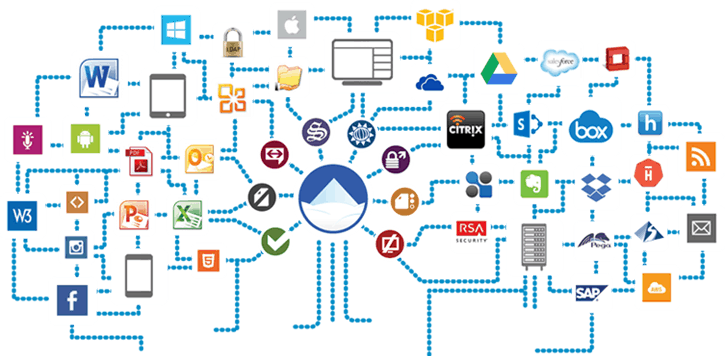So, So, So… the once-hyped, now-true API economy has finally arrived, even in the darkest corners of the Global 2000 market that we serve. Even customers in highly sensitive areas of the economy such as healthcare and financial services are finally taking advantage of the value-add approach of the API economy. Further, the API economy is truly realization of economic hyper-specialization that Adam Smith wouldn’t even have dared dream of in The Wealth of Nations.
Now, how does this trend impact business intelligence initiatives in our modern times? Well, let me ask you this, do you think that data will become more or less siloed from the picture above as a result of this new reality? I think the picture speaks for itself. As organizations, ecosystems, and communities grow, specialization happens naturally to fit people & technology into the place where they belong. By people through their gifts (and personality types) and by technology through it’s best use. For example, the Google Maps API is most heavily used and re-used via a variety of applications (Uber/Lyft) to ensure location service is provided when needed. And, let’s say that people with an INTP personality type end up in the sciences (be it computer science or other) where they can thrive and be happy. Specialization has its benefits!
Before I get into the technology side of things in BI, we can speak a bit of the downside of specialization. When communities and organizations segment into a smaller and smaller units, what happens to communication? It becomes fragmented, requiring technology to fill in the gaps. An example here: “Hey, I invited you to my party on Facebook, but you never came!” Who has the time to write a letter anymore? Yes, technology fills in the gaps there, albeit not without downsides. And, as technology, organizations, and communities become fragmented, silos develop. So, information is siloed and communication is fragmented. Finally, think of how many departments large organizations have vs. small companies.
So, to summarize, specialization enables growth but fragments information and communication. Agreed?
Now on to the BI world. There are a few trends happening that are pretty much recurring themes if you’ve spent any time in technology which are:
- Best of Breed vs. Single Platform – Pyramid Analytics vs. SAP Business Objects
- Constant Innovation Introducing Improved Technologies (not necessarily new though)
- Acquisitions that keep the Large Technology Providers on Top (Software Margins)
Because of these forces and the theme of specialization, we’re seeing embedded BI solutions (Salesforce Wave Analytics, Intuit Fathom Analytics, and ServiceNow Performance Analytics) go head to head against the BI platform players, although differently in different market segments. For example, in companies with 1-100 employees, you might see Intuit Fathom Analytics competing against a Yellowfin BI platform due to price, functionality, and requirements. However, in the global 2000 market, you’ll see ServiceNow Performance Analytics go against SAP or Microsoft PowerBI.
So, here’s where specialization and competition come into play in the API economy and things get exciting. When Microsoft goes head to head in their core competency (BI in the Server & Tools division + Cloud-based PowerBI) vs. ServiceNow Performance Analytics whose core competency is IT Applications, who wins? Next, when Salesforce.com takes their wave analytics solution to compete against Microstrategy 10 Analytics, who wins? Do you think that embedded BI solutions contribute to silos? With their inability to connect to other data sources? Will Fathom Analytics become the de facto standard for bringing together data across all of the different silos? Or will it be PowerBI?
In my mind, there are multiple short-term and long-term winners in all of the different markets. What do you think?
